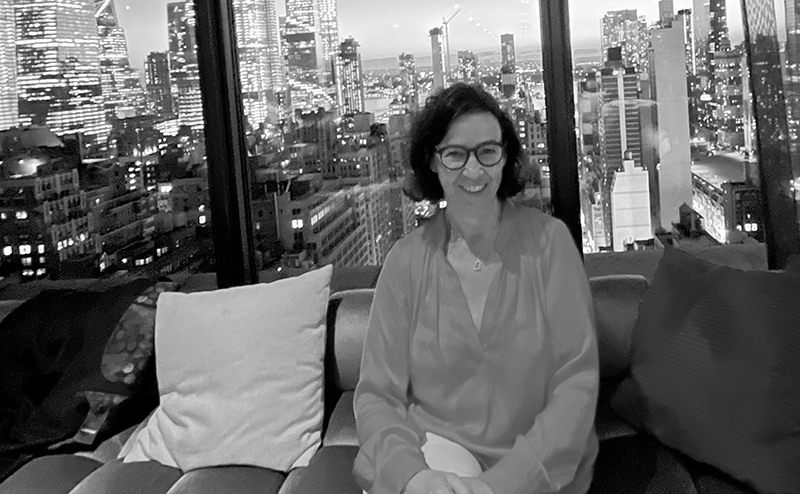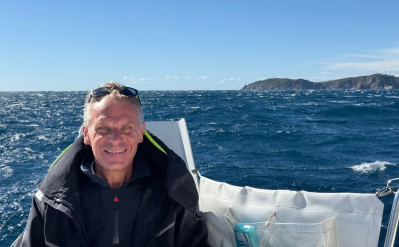News

Isabelle André (SKEMA 1996): “Working in HR means being both demanding and kindly”
Currently an expatriate in New York, where she works as Director, HR Operations and Analytics Americas for the Richemont Group, Isabelle André looks back on her professional development and the highlights of her career, from her studies at the SKEMA Business School to her expatriation to the US.
Can you tell us about your academic career?
I am originally from north-east France and I grew up in the country, as my parents were farmers. I think my childhood on the farm really helped me to build a work culture and develop a taste for hard work.
After preparatory studies in Reims, I did the Masters in Management at the SKEMA Business School (formerly CERAM), at the Sophia Antipolis campus. During my course, I decided to specialise in Human Resources: an area that had always appealed to me. I graduated from SKEMA in 1996.
Why did you choose SKEMA Business School? What do you remember most about the course?
I had always wanted to go to a top business school and SKEMA had a very good reputation. Its presence at the Sophia Antipolis site also offered a very promising environment and a broad range of opportunities.
I really enjoyed my experience at the school.
At the time, it already had a considerable international outlook, as well as strong links with the local business community. So there were a lot of professional openings for students. That meant I could get into the business world very quickly.
Community life was also very dynamic. I was involved in the theatre association and various voluntary associations. In particular, I was Secretary of the Alpes-Maritimes association for the Restos du Cœur.
From an academic point of view, the courses were very well planned. A lot of the knowledge I acquired in finance, marketing, HR and international law is still useful today in my work.
SKEMA Business School also helped me to understand what I learned in a very hands-on way, through case studies and the sort of issues and challenges found in the real world. This enabled me to develop a sharp eye, intense curiosity and unrivalled qualities of analysis and synthesis.
After my studies, I kept in touch with SKEMA. I got involved in the alumni association and I was also a teacher in International Human Resources Management at the SKEMA Business School.
How did you get into the job market after graduating from the SKEMA Business School?
I was lucky enough to be part of the first apprenticeship programme organised by the SKEMA Business School. In my final year, I was able to join the American pharmaceutical group Allergan, in Sophia Antipolis. At the end of my apprenticeship, I was offered a job and ended up staying with the company for eight years!
I was hired to help in setting up an ERP (Enterprise Resource Planning) system: a large information system for human resources management.
So I got involved in setting up the management systems. I enjoyed it and quickly became an expert in SAP in the deployment of information systems for human resources.
The group then asked me to roll out the HR information system in the group's subsidiaries across Europe. This European tour lasted two years, and I was assigned to Ireland, Germany, England and Italy.
I then returned to France, where I was in charge of managing the HR SAP skills centre for Europe. I regularly went back and forth to California, where the management was based.
Then I met my husband and we moved to Haute-Savoie. I then found a job in Biel, Switzerland, with Rolex, where I was also in charge of setting up an HR SAP.
Soon after, I joined an international NGO in Geneva, the International Organisation for Migration, affiliated to the UN. This was a fascinating experience in a totally new sector.
In 2006, I finally joined the Richemont Group in Geneva, still as an HR SAP specialist.
I then wanted to develop other skills in Human Resources, and move away from the highly technical work involved with information systems. So I joined the Compensation and Benefits department, still with Richemont.
At the time, the group had opened a huge 45,000 m² campus in Geneva with over 1,000 employees, which housed several Richemont companies.
I was in charge of HR at the site and helped to receive employees and the group's entities. I also set up an HR Shared Services Centre for the site. The group's HR Director then asked me to roll out the same operation with all the Richemont companies in Switzerland. So I created an HR skills centre for all the Richemont back-office functions – payroll management, social insurance, taxes, information systems, compensation and benefits, and so on.
As I was keen to seek out new opportunities, I then joined the Richemont group’s American subsidiary in New York just under a year ago, where I am currently working.
I have the same tasks as in Switzerland: I am in charge of all HR operations and information systems. It's a very interesting experience. The Richemont companies are really growing in the US, so there is a lot to do.
New York, particularly Manhattan, where I live, is an incredible melting pot, with a tremendous wealth of cultures, languages and nationalities.
What is your job as Director, HR Operations and Analytics for Americas with the Richemont Group in New York?
I am responsible for the entire region (USA, Canada, Brazil and Mexico) for HR operations. My role is to ensure that all processes concerning recruitment and the employee life cycle are carried out in the proper conditions, in compliance with local legislation.
The Richemont group includes several well-known companies like Cartier, Jaeger-Lecoultre, Montblanc and Chloé. The group also has a large distribution centre in Dallas, Texas, as well as a shared services centre in Connecticut. So I'm responsible for making sure that these different sites comply with legal requirements and the group guidelines.
I'm also responsible for ensuring that HR applications are working well, organising the HR teams internally and checking that information systems are properly implemented. I’m also involved in the continuous improvement process and digital transformation of HR department.
In addition, I create dashboards and management tools to get an overview of the figures and recruitment issues. In the US, luxury goods are less attractive than in Europe: it's a very tight sector here. So there is a lot of work to be done to improve the sector’s attractiveness and employee retention.
What qualities do you need to work in HR?
I think that commitment is really essential in this sector. You need to have a liking for work well done, and a keen interest in quality. You must also be able to show considerable respect to other people. Performance is vital, of course, as the sector is quite competitive.
I also think it’s very important to be ahead of the curve – to be one step ahead, and keep abreast of innovations and new technologies. You have to be very curious, constantly seek out the latest information and learn all the time.
Curiosity is incidentally something I have never lost, thanks to my studies at SKEMA Business School. Since school, I have constantly kept up to date with developments, so that I can stay on top at all times!
You have to be demanding in order to achieve the desired results, but also show great kindliness towards employees.
What advice would you give to young graduates who want to work in HR?
It may sound a bit old school, but I think you chiefly need to show that you have a responsible, reliable attitude. You also need to be thoughtful, take the time to become familiar with the sector and the company you are applying to, and explain your motivations and interest convincingly.
I also think it’s crucial to be demanding with yourself and be ready to fight to achieve your objectives.
Contact: Isabelle André, Director, HR Operations and Analytics with Richemont Americas
Interview by lepetitjournal.com for SKEMA Alumni




